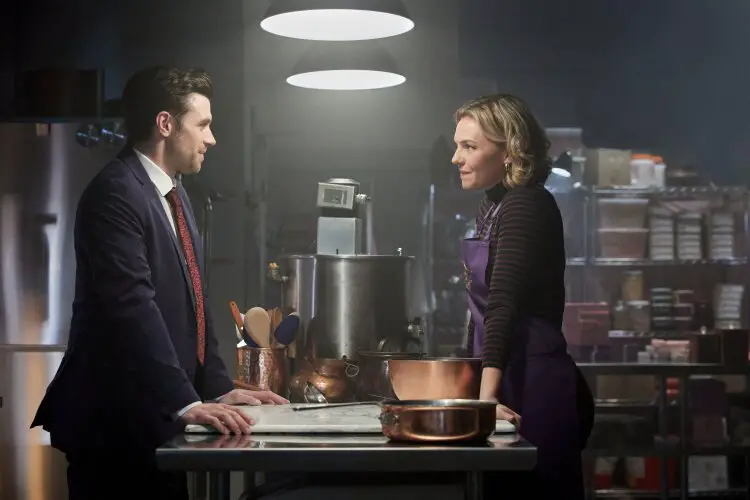It is said that love is many things: patient, kind, tenacious, strong. In the Hallmark Channel movie (based off a novel by Lizzie Shane) Sweeter Than Chocolate, however, love is above all brave. After all, it takes courage to open yourself up to someone fully, showing them your best and worst sides and trusting they’ll love all of you. Loving someone fully, knowing you might lose them someday to illness and death requires tremendous bravery.
Which is why Lucy (Eloise Mumford), chocolatier and heroine of Sweeter Than Chocolate is such a study of contradictions. On the one hand, she sells special chocolates that, according to family legend, will help you find true love. If you keep your mind – and heart – open to it. On the other hand, she has never personally tried her own family’s legendary chocolates. Not because she doesn’t believe but because she does, and she’s scared of loving someone as deeply as her parents once did. Particularly after seeing the toll grief took on her mother (Brenda Strong) after losing her husband to illness.

While Lucy is a true believer, Dean (Dan Jeannotte) is not. A reporter who usually covers the exposé beat, he’s looking to move to a morning anchor spot. Which means covering feel-good stories like chocolates that help you find true love, although his natural inclination is to treat it like a scam. Although Lucy and Dean start off on the wrong foot, they end up having to work together to serve their own goals: Dean needs to make a good impression with the bigwigs to prove why he should be given the open anchor slot, and Lucy needs to improve sales following a rent increase on the shop.
It’s a tried-and-true enemies-to-lovers romance. The two – at first begrudgingly – grow closer over the course of their partnership. They slowly open up to each other, with Lucy admitting why she’s never eaten her own legendary chocolates, and Dean confessing what draws him to fight for the “little guy.”
It’s common for romance movies to feel rushed in the actual “romance” department. It’s natural, given the time constraints, which require a couple to meet, fall in love, face adversity, and come back stronger for it in little less than two hours. But the romance doesn’t feel rushed in Sweeter Than Chocolate. The initial conflict between Lucy and Dean feels natural (though Dean should learn to make sure he knows who he is – or isn’t – talking to before confessing his skepticism). Lucy doesn’t quickly move past her first impression of him. Neither does he quickly let go of his innate cynicism.
These are two people who fall in love very much against their own will. And you feel that, watching the movie. But you also see what draws the two of them together. The story is helped by not trying to contrive dramatic tension – for example, by having Dean decide at some point to “expose” the chocolates as a sham. He’s skeptical, but he’s genuine in their partnership. For her part, Lucy recognizes his cynicism, but she comes to see and appreciate the reasons for it.
Their “conflict” comes from real internal conflicts, as opposed to forced misunderstandings. Dean’s always dreamed of being a news anchor on a national stage, and he’s been trying to move to the big city to pursue that dream. Lucy’s may be in the business of helping people find true love, but she’s also scared of opening herself up to that very thing. Because what happens if she finds it and loses it, as her mother did?

It’s this subplot that gives Sweeter Than Chocolate depth and makes it stand out from normal feel-good Valentine’s Day romantic fare. Romantic stories always focus on the Happily Ever After. (And seeing people meet and fall in love is why we watch and read these stories, let’s be honest.) But what happens after the Happily Ever After? And what if Ever After isn’t forever, as we wish it could be?
Lucy’s scared of love because she saw how losing it devastated her mother. After all, the chocolates promise you’ll find your true love…if you’re open to it. There’s no guarantee that you’ll be able to keep it forever. Her parents lost their HEA when her father grew sick and died, and Lucy saw first-hand what devastation that could bring. What she comes to realize over the course of the film (with her mother’s help) is that love is worth that risk.
When her mom confessed that she’d eat the chocolate and fall for her late husband all over again, knowing how their story would end and the pain it would bring, because their love was worth the pain? That hit me right in the feels. It’s worth it to chose love, even if you knew it would end in pain. The joy love brings is worth any amount of sorrow.
And that’s really why choosing love is an act of not just courage, but faith as well. Love requires that you take a chance, not knowing how your story will end. It also requires that you trust that the love you share will be greater than the chance of unimaginable sorrow in the future.
Sweeter Than Chocolate is a sweet romance, just in time for Valentine’s Day, that feels more real than many similar films, in its reminder that love is worth whatever comes after the Happily Ever After.

